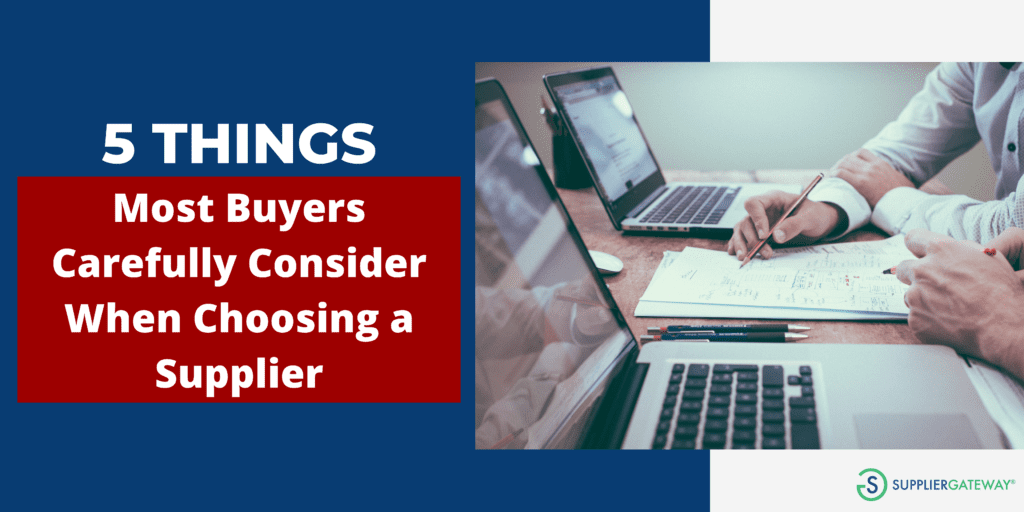5 Things Most Buyers Carefully Consider When Choosing a Supplier

Great suppliers are essential to a successful business, which allows one to produce and deliver the best possible goods and services. However, finding the right suppliers can be tricky – after all, there are often many suppliers out there offering the same product, but not always with the same quality and consistency of service. Buyers are always looking for a reputable supplier with competitive pricing.
What is the right supplier?
The right supplier is a partner that provides the most suitable goods and services at the optimal prices in the right time frames requested by the buyer.
As a supplier, are you wondering what the most important factors are that buyers take into account when choosing a supplier? If so, you’re not alone! Here are four common things that buyers often consider when deciding to partner with a supplier:
1. Qualification Criteria:
Every business has its own requirements and standards for their suppliers. As a supplier, you should be aware of your potential customer’s standard criteria, including price, quality and delivery or service timeframes, before talking to them. Each buyer might also have special requirements such as minimum or maximum orders, payment methods, guarantees, etc.
Besides, some other less tangible criteria like efficiency, transparency, friendliness may decide whether your prospect will close the deal with your business. People always want to work with a motivated partner who can be relied on to get the job done.
Understanding all of it before submitting that bid will help you one step closer to the deal. Consider participating in buyer intelligence-gathering sessions, such as our QuickConnect Matchmaker feature – buyers use this as a way to understand the market better – you can use this as much valued one on one time with your future customer.
2. Experience in the market and current references:
Who were and are you working with? What did they say about you? Have you done any business with a partner in the same industry? Do you have any references that we can talk to? These factors are critical to determining whether your business is likely to bring the best value and lower risk to a buyer.
It’s not strange for a buyer to ask you all these questions because to them, choosing a supplier is like hiring a new recruit – they’re about to step into a long-term relationship with you. Therefore, it’s common for them to get an honest review of your past partnership, including good and bad points.
To make things a bit easier for buyers, who are always busy and looking for an easier way to get to the “shortlist,” your profile includes an SG score, a rating system that measures supplier performance, in our app. You should know your own score and take easy steps to maximize it. It makes you easier to find and may help you stand out above others.
3. Financial Security:
Buyer’s seldom want to work with a supplier who doesn’t have a strong enough cash flow to deliver what they want and when they need it. For their peace of mind and protecting a business, the vetting process is often a high priority task before considering other factors.
So how could a buyer assess your financial stability? This is a sensitive subject, especially with small or privately held companies. Diligent buyers gather and monitor critical financial information on suppliers such as suites, liens, judgments, and financial stability.
With that being said, as a supplier, you should know as much about how you look to prospective clients as they know about you. Proactively manage your business’ financial “face to the world” by monitoring your financial risk profile at least once per quarter.
4. Strong service and clear communication:
Over the years, the consequence of late orders, delivery delays or taking too much time to resolve an issue has impacted dramatically not only buyer’s expenses but also their customer retention. One study found that 69% of consumers “are much less or less likely to shop with a retailer in the future if an item they purchased is not delivered within two days of the date promised.”
Therefore, clear communication and quick responses are other factors that you, a supplier, need to remember while working with any buyers. The best suppliers actively ask for buyers’ needs and strive to understand how they can do the job better.
5. Location, Location, Location:
As you might know, for a variety of reasons, the local sourcing trend has been recently increasing and is becoming a new normal, especially during the COVID-19 pandemic. According to Thomasnet.com, 72 percent of industrial/B2B buyers “always or generally” prefer to source locally.
This creates an opportunity for you to expand your market presence with prospects who may formerly have been looking elsewhere. There are a few ways to facilitate “being found” – Make sure your profile is complete and up to date, take advantage of any stage you can stand on to elevate above your peers – for example, being an Amazon Business seller is one easy way to make it convenient for buyers to buy from you. Pay close attention to postings and bid opportunities nearby – you may have a built-in advantage. Make the best use of it!
About Us:
At SupplierGATEWAY, we offer a robust platform for suppliers where you can gain access to new business opportunities and connect with customers of all sizes – from Fortune 500 companies and globally recognized companies to your local health system, manufacturer or business. Our easy-to-use app will help you stay connected to the opportunities that could make all the difference to your bottom line.